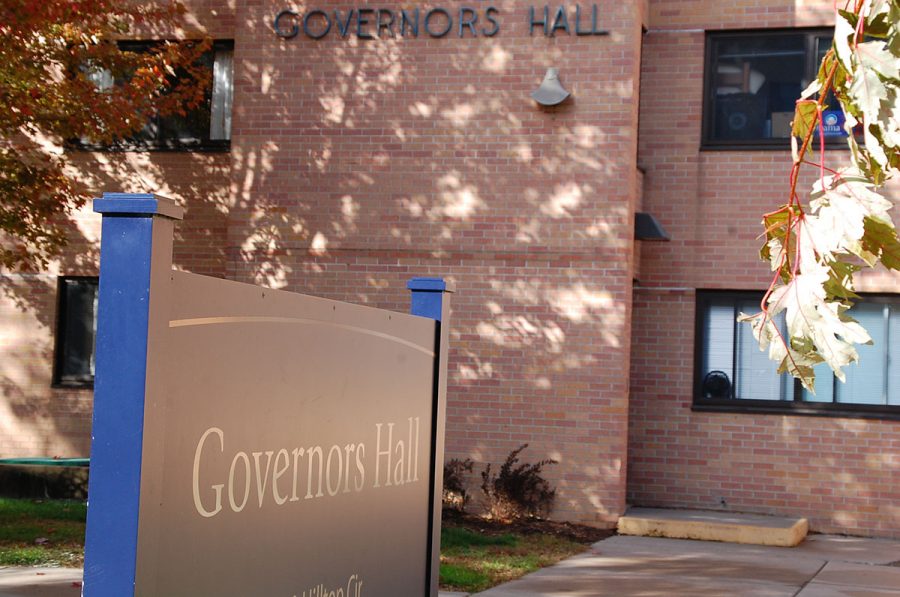The pressing concern in university housing
UW-Eau Claire resident assistants undertake additional work responsibilities and alleged unpaid work hours
More stories from Evelyn Nelson
November 17, 2021
More stories from Lauren Spierings
Photo by SUBMITTED
Additional responsibilities for resident assistants include six additional front desk work hours allegedly without pay and no hazard pay when responding to COVID-19 related incidents.
The COVID-19 pandemic has resulted in additional stressors and necessitated additional safety precautions for returning university students. Resident assistants at UW-Eau Claire are no exception, as they have already faced a multitude of responsibilities to begin with.
“I barely have time to see any of my good friends that have now moved off-campus,” an anonymous source said. “It has already taken a toll on my mental health. I have to be an RA first, even above being a student.”
RAs — on and off campus — have been instructed not to speak with the press. In light of this, the official sources interviewed for the RA perspective have been listed as anonymous in order to protect their jobs.
This semester, RAs are reportedly undertaking up to six additional unpaid work hours to keep the residence halls running.
“There was no warning,” one source said. “We got an email in the middle of the summer telling us this, with almost no information except that it is now an expectation of ours to work an extra six hours. We are expected to work on RA related tasks, such as planning events and making bulletin boards, but it is impossible to do these things when we are working (additional hours).”
This is refuted by Quincy Chapman, the director of housing and residence life. According to Chapman, the RAs work 20 hours per week in building management alongside their general job description, which includes responsibilities such as duty rounds and enforcing residents’ health policy.
In addition to 20 hours of departmental contribution, the RAs must work five hours of departmental contribution, which Chapman said are all paid work hours.
“Some might be working at the think tank,” Chapman said. “Some might be doing other departmental committee work. But it’s not unpaid, they’re paid for it.”
Deborah Newman, associate director of housing and residence life, said the university administration has worked hard to ensure that no resident assistants were cut in pay when adding additional work hours.
However, staff throughout the university are currently experiencing pay furloughs, which may result in a redistribution of funding toward RAs’ pay, in comparison to hours worked, Newman said.
“In asking the RAs to redistribute their effort for hours they are already being paid, we feel we’re meeting the needs of residents and providing a fair employment package for the RAs this year,” Newman said.
As detailed in the RA housing contract, their wages are currently being displaced to housing and meals — the same as previous years before the pandemic.
Another point of inconsistency lies in the expectation of whether RAs will or will not have roommates.
One of the anonymous sources said the RAs were not informed they would be receiving roommates until just before they were required to turn in their intention forms for the next semester.
“When Housing told RAs that we were required to have roommates, it was the night before we were required to have our RA intentions in,” an anonymous source said. “Most people — including myself — had already filled out our RA intention over a week prior.”
According to Chapman, this is inaccurate. In the past, there was only one year where RAs did not have to have roommates.
This was due to a surplus in housing, Chapman said. The resident assistants were told in that year they would likely have roommates the following year and would be unable to buy out the other half of their rooms.
“This is a year where we weren’t able to do that,” Chapman said. “So, we’ve had a long tradition of over three decades of RAs always having roommates, there’s only been one year where they haven’t had roommates.”
When requested to respond to COVID-19-related issues on campus — including how in some situations, RAs are expected to drop off daily meals to quarantined residents — there has been no additional compensation for COVID-19 efforts and few alterations to ensure the safety of student employees.
“There’s actually no one in the University of Wisconsin System who received hazard pay at any level of staffing,” Chapman said. “So, I don’t receive hazard pay and it’s not provided for in the UW System personnel policy.”
At the beginning of their contract, RAs were told, if they were not comfortable with the new working environment, they should inform Housing so someone else could be hired instead, an anonymous source said.
Newman said the Housing and Residence Life department has been open to feedback from RAs on responsibilities that were new within their housing contract.
“We provided some time for them to ask questions of the housing staff during training and provide some feedback this year that typically isn’t part of training,” Newman said. “The rest of the staff is also having this experience, but we want to provide what we can for students this year — we are all doing our best to cope.”
As the semester continues, RAs are directed to approach their hall directors for guidance — though many are still reportedly doubtful any resolution toward their concerns will be made.
“Some of my hopes for the future is that the University can learn to respect RAs,” an anonymous source said. “As of right now, I feel that I am being taken advantage of and there is no platform to have a voice on any of my concerns.”
Nelson can be reached at [email protected].
Spierings can be reached at [email protected].

Timothy Spierings is a fourth-year Spanish and journalism student. This is their eighth semester on The Spectator staff. They enjoy trying all types of new foods and listening to new music artists and are currently trying to learn the bass guitar.











